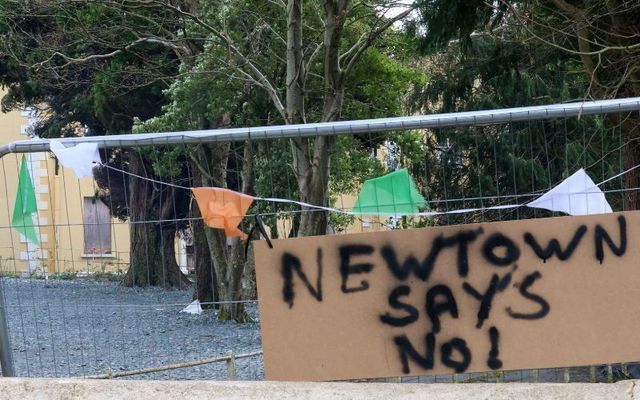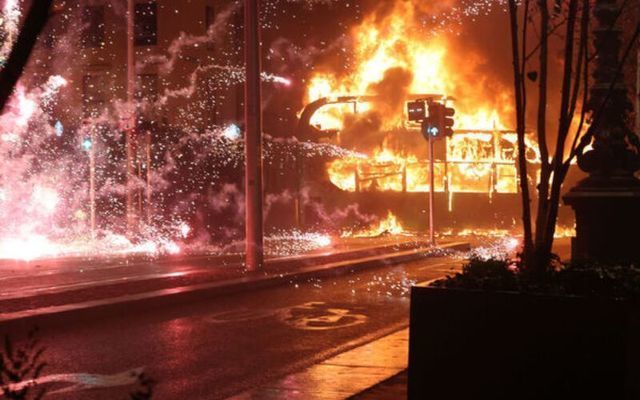Seven in ten people believe the State should follow the UK’s lead and deliver swift justice to those who carry out violence at anti-immigration protests, an Irish Daily Mail poll has found.
UK prime minister Keir Starmer vowed a zero-tolerance approach to those who rioted across Great Britain and in Belfast following the Southport knife attacks on July 29.
This included a fast-tracking of trials to send a message to violent offenders – with extra prosecutors deployed and sittings ordered – in the belief that the speed at which justice was delivered would deter others.
Ireland has seen its share of violent anti-immigration demonstrations in the past year – including the Dublin riots in November, as well as protests in Coolock, north Dublin, and in Newtonmountkennedy, Co. Wicklow.
Amárach Research carried out a survey of 1,000 people for the Mail, asking: ‘Would you be in favour of fast-track trials to tackle violence at anti-immigration protests?’ A total of 70% of respondents agreed, while 18% said no, and 12% said they ‘don’t know’.
More than 640 people in England and Wales have been charged with violent disorder, including a 12-year-old boy, following widespread riots in the aftermath of the Southport stabbings. Among these, approximately 190 people have already been sentenced, with majority sent to prison, for an average length of two years.
David Wilkinson, 48, from Hull, was convicted of violent disorder, racially aggravated criminal damage and attempted arson. He was sentenced to six years in prison and is subject to a criminal behaviour order for five years.
A further 43 people have been arrested and 33 people charged following race riots in Belfast earlier this month, which were also attended by members of antiimmigration groups from the Republic, including the ‘Coolock Says No’ group.
Our poll shows that people aged 55 and over want to see fast-track trials more than any other demographic, at 83%. But support was high among all demographics, with 55% of those aged between 25 and 34, and 60% of 18-to-24-year-olds, agreeing this measure should be implemented.
The Amárach survey also notes that slightly more males (72%) want to see speedy court trials compared with 69% of females.
More than 30 arrests were made and over 20 people have been charged with a range of public order offences following a series of disturbances in the suburb of Coolock on July 15.
Two fire engines are on scene at a fire in the former Crown paints building in #Coolock.
The fire in a lobby area has been contained and we expect firefighting operations to be wound down soon. pic.twitter.com/d8GfRBpxoe
— Dublin Fire Brigade (@DubFireBrigade) July 18, 2024
Most of the arrests took place in the hours and days after the disturbances, and while those detained have appeared before the courts, none has been sentenced. They were subsequently released on bail and are due to appear before the courts again next month.
In addition, over 30 people are awaiting sentencing following their involvement in the Dublin riots on November 23.
Justice Minister Helen McEntee said at the time that they could face up to ten years in jail, but gave no timeframe on when they would be sentenced.
‘We have very, very strong legislation – up to ten years in prison with up to 12 years as well for someone who assaulted a member of An Garda Síochána,’ she said.
More than 50 gardaí were assaulted during the chaotic scenes in the capital.
Multiple videos shared on social media showed officers being attacked from behind.
More recently, six arrests were made and four people were charged in connection with disturbances at a proposed accommodation centre for international protection applications in Newtownmountkennedy. The charges faced by the four individuals relate to alleged loitering in a public place without a reasonable excuse, leading to concern for the safety of people, property or public place – and alleged failure to comply with Garda instructions to leave. Their cases are still before the courts.

April 15, 2024: The scene at the proposed International Protection Applicants migrant centre River Lodge in Newtownmountkennedy, Co Wicklow. Credit: Rollingnews.ie
Additional lawyers have been brought in to handle the UK’s surge in court cases following the recent week-long riots. The Crown Prosecution Service described it as a ’24/7 out-ofhours charging service’.
In a crackdown responding to the riots in the UK, more than 1,100 people were arrested.
On the sixth day of escalating violence, Mr Starmer made it clear the courts would come down hard on those involved.
‘I guarantee you will regret taking part in this disorder, whether directly or those whipping up this disorder online and then running away themselves,’ he said in a televised address.
Stephen Parkinson, Director of Public Prosecutions for England and Wales, said extra lawyers had been drafted in and would work round the clock to ensure that justice is served.
Social Democrats TD Gary Gannon told the Mail that those who inflict violence on our streets need to feel ‘the full consequence of the law’, but stressed the importance of a fair trial.
‘People with quite significant profiles, some who hold elected office, regularly incite violence against vulnerable people,’ he said. ‘I do feel people have the right to a fair trial and fair hearing, but I don’t think it can be done as quickly as it’s happening now in the UK.’
* This article was originally published on Extra.ie.




Comments